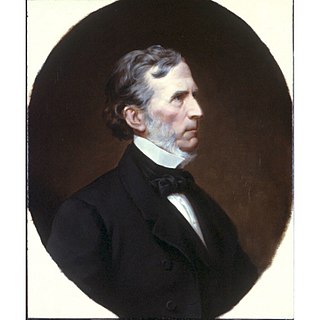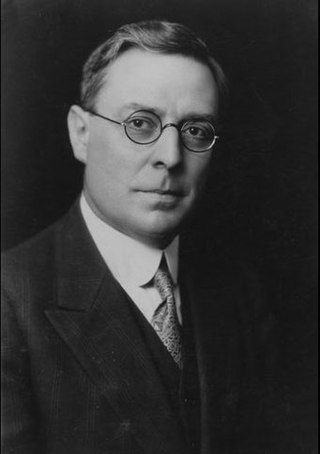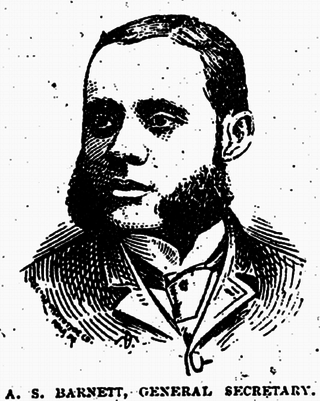
The Nineteenth Amendment to the United States Constitution prohibits the United States and its states from denying the right to vote to citizens of the United States on the basis of sex, in effect recognizing the right of women to a vote. The amendment was the culmination of a decades-long movement for women's suffrage in the United States, at both the state and national levels, and was part of the worldwide movement towards women's suffrage and part of the wider women's rights movement. The first women's suffrage amendment was introduced in Congress in 1878. However, a suffrage amendment did not pass the House of Representatives until May 21, 1919, which was quickly followed by the Senate, on June 4, 1919. It was then submitted to the states for ratification, achieving the requisite 36 ratifications to secure adoption, and thereby go into effect, on August 18, 1920. The Nineteenth Amendment's adoption was certified on August 26, 1920.

Wabash is a city in Noble Township, Wabash County, in the U.S. state of Indiana. The population was 10,666 at the 2010 census. The city is the county seat of Wabash County.

The Joint Committee on Reconstruction, also known as the Joint Committee of Fifteen, was a joint committee of the 39th United States Congress that played a major role in Reconstruction in the wake of the American Civil War. It was created to "inquire into the condition of the States which formed the so-called Confederate States of America, and report whether they, or any of them, are entitled to be represented in either house of Congress.”

The Mystic Order of Veiled Prophets of the Enchanted Realm, also known as M.O.V.P.E.R. or The Grotto, after its lodge equivalent, is an appendant body in Freemasonry.

Bethuel Middleton Kitchen was a nineteenth-century politician from Virginia and West Virginia.

Benjamin Franklin Howell was an American Republican Party politician who represented New Jersey's 3rd congressional district in the United States House of Representatives from 1895 to 1911.

Ruggs is an unincorporated community located in the southern portion of Morrow County, Oregon, United States. Ruggs lies at the junction of Oregon Route 206, Oregon Route 207, Rhea Creek Road, and Upper Rhea Creek Road. The community is situated at an elevation of 2,136 feet (651 m). The community is named after Edward E. Rugg Jr., one of many in the Rugg family who were prominent farmers and ranchers in the area starting in the early 1900s. Ruggs also at times has been referred to as "Ruggs Junction" or "Ruggs District."

Canoe Island is a 47-acre island located in the center of the San Juan Islands, an archipelago in the Northwest region of Washington State. Situated within the Upright Channel, Canoe Island lies between Shaw and Lopez Islands. The Island's maximum elevation is 127.7 feet and its surface is mostly forested with second-growth cedar, fir, hemlock, and madrona. The island also has some old-growth trees. The rocky shoreline of Canoe Island is bordered by dense forests of bull kelp.

Charlotte May Pierstorff was shipped alive through the United States postal system by parcel post on February 19, 1914. After the incident, parcel post regulations were changed to prohibit the shipment of humans.

Frances Sevilla Cleveland Axtell was one of the first female legislators in the United States of America, elected to the Washington House of Representatives in 1912.

William John Cooper was an American educator who served as US Commissioner of Education from February 1929 to July 1933.

The Congress Mine is a gold mine located at the ghost town of Congress, Arizona on the southeastern slope of the Date Creek Mountains, approximately 18 miles north-northeast of Wickenburg, Arizona at an elevation of about 3,000 feet. The nearest community, four miles away, is modern Congress, formerly known as Congress Jct railroad station or Martinez Post Office. The Congress Mine produced substantial quantities of gold and was considered one of the most productive gold mines in Arizona.

Kitty Marion 12 March 1871 – 9 October 1944) was born Katherina Maria Schäfer in Germany. She emigrated to London in 1886 when she was fifteen, and she grew to minor prominence when she sang in music halls throughout the United Kingdom during the late 19th century. She became known in the field for standing up for female performers against agents, corruption, and for better working conditions. She joined the Women's Social and Political Union (WSPU) in 1908, engaged in selling their newspaper Votes for Women and became a prominent suffragette in the United Kingdom for her participation in civil unrest protests including riots and arson. As a result, Marion was arrested many times and is known for having endured 232 force-feedings while on hunger strike in prison. She is quoted as saying “there are no words to describe the horrible revolting sensation.” When World War I started she emigrated to the United States, and there she joined the team on Margaret Sanger’s Birth Control Review. Although she used her tenacity and loud voice to get people to pay attention to her cause, she did not use violence as much as she had in the United Kingdom, although she was still arrested many times for advocating birth control.

Alfred S. Barnett was an American journalist and civil rights activist in Omaha, Nebraska, Des Moines, Iowa, and Chicago, Illinois. In Des Moines, Barnett created and ran the newspaper, The Weekly Avalanche from 1891 to 1894. Before moving to Des Moines, he contributed to his brother, Ferdinand L. Barnett's Omaha paper, The Progress. He worked for civil rights also a member and an officer of numerous civil rights organizations, including the Nebraska branch of the National Afro-American League and the Afro-American Protective Association of Iowa. Barnett was described as a "pleasing speaker".
John Jay McKelvey was an American author, attorney, and preservationist who set precedents in establishing the Harvard Law Review and in framing case law to craft the environs of his Spuyten Duyvil community, New York.

Matilda Hall Gardner (1871–1954) was an American suffragist and a member of the national executive committee of the National Woman's Party.
George E. Bovee served as Secretary of State of Louisiana from 1866 to 1872 during the Reconstruction era after the American Civil War. He was a Republican.

Merritt Horace Day, sometimes called Col. M.H. Day, was an early pioneer, rancher, mine owner, and legislator in the Dakota Territory, as well as commander of an irregular state militia in South Dakota during the Ghost Dance War. He was a "pronounced advocate for the division of Dakota," and Day County, South Dakota is named in his honor.
















